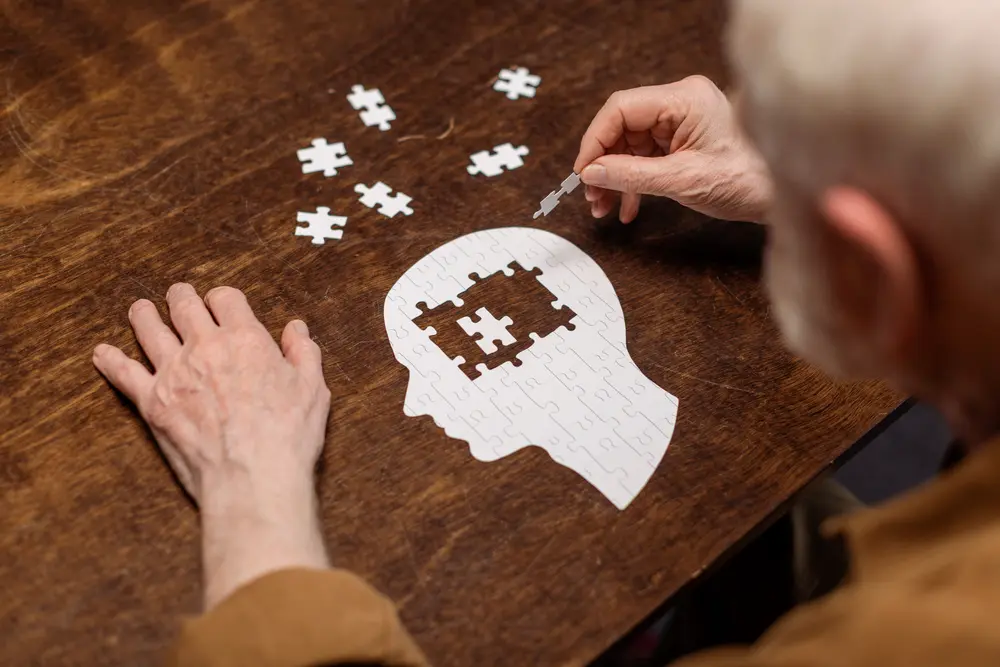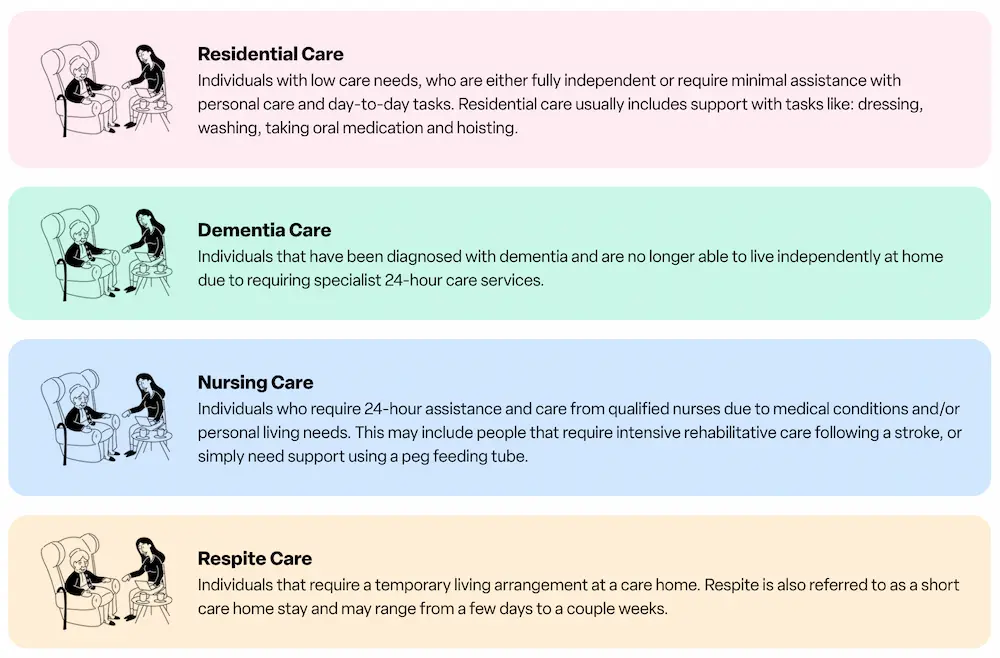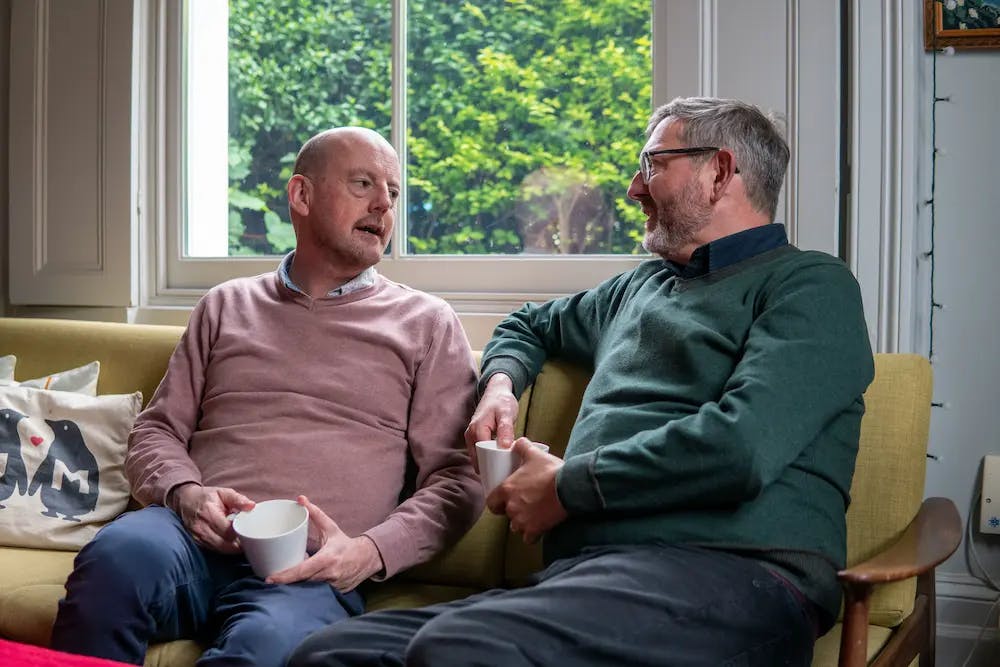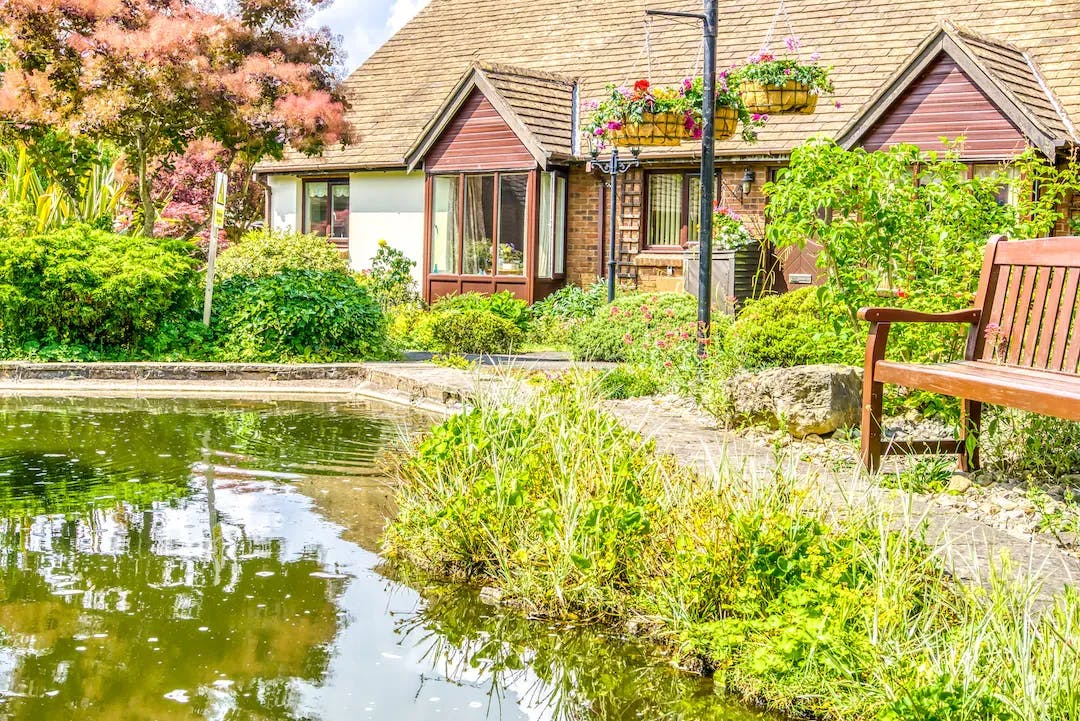What’s The Difference Between Dementia and Alzheimer's Disease?

Estimated Reading Time: 7 minutes
The terms dementia and Alzheimer’s are often used interchangeably, but they mean different things. Below, we’ve explained the difference between dementia and Alzheimer’s disease.
This article also explores how to get a dementia diagnosis and the support available to people living with dementia or Alzheimer’s, including in a dementia care home.
Need to find dementia care fast?
Browse the best dementia care homes for your loved one.
In this article:
- What’s the difference between dementia and Alzheimer’s disease?
- What is dementia?
- What is Alzheimer’s disease?
- Getting a dementia diagnosis
- What support is available for people living with dementia or Alzheimer’s disease?
What’s the Difference Between Dementia and Alzheimer’s Disease?
Dementia is the umbrella term for groups of conditions that cause the brain to gradually decline over time, affecting brain function as a result. Symptoms that can arise from having dementia include changes in behaviour, critical thinking, reasoning and communication, as well as memory loss over time.
There are several types of dementia, and Alzheimer’s disease is the most common of these, with symptoms varying from type to type of dementia.
Alzheimer’s disease first affects parts of the brain associated with memory and thinking clearly, with early symptoms including changes to both of these.
The treatments used for Alzheimer’s and some other types of dementia are similar, including approved medicines such as donepezil, rivastigmine, galantamine and memantine, along with different types of therapy and person-centred care.
What Is Dementia?
Dementia is a term for groups of conditions that affect brain function, including memory, problem-solving, critical thinking, communication and behaviour.
Several types of dementia fall within this group of conditions, each with slightly different causes and symptoms.
For example, vascular dementia is caused by reduced blood flow to the brain, while Lewy Body dementia is caused by a build-up of proteins inside the brain cells.

What Is Alzheimer’s Disease?
Alzheimer’s disease is the most common type of dementia.
According to the National Institute for Health and Care Excellence (NICE), it accounts for 50-75% of dementia cases. This means that in the UK, an estimated 472,000 to 708,000 are living with Alzheimer’s.
Alzheimer’s largely affects the hippocampus, which is the part of the brain in charge of memory. Over time, Alzheimer’s also affects thinking skills and leads to behavioural changes.
Like with all types of dementia, Alzheimer’s symptoms gradually progress over a number of years.
Early symptoms are usually linked to short-term memory issues and thinking less clearly, including things like:
- Forgetting conversations or events that happened recently
- Difficulty performing everyday tasks such as shopping and cooking
- Being unsure what to say when communicating
- Repeatedly asking the same or similar questions
Meanwhile, middle and later stage symptoms include:
- Finding it tougher to communicate, including speaking, reading and writing
- Increased confusion
- Reduced short and long-term memory
- Wandering (and regularly disturbed sleep)
- Mood changes and feelings of anxiety or frustration
We’re here to help you find the right dementia care home for you or your loved one. You can request a free list of dementia care homes from our care experts, who will then share homes matching your budget and location. You can also search for a dementia care home through our easy-to-use directory.
Getting a Dementia Diagnosis
If you think your loved one may have dementia, you can get a diagnosis. The earlier dementia is diagnosed, the better.
Dementia symptoms vary from type to type. Here are some of the most common symptoms of dementia:
- Memory loss
- Communicating becoming more challenging, including through speaking, writing and reading
- Confusion with understanding what time or day it is
- A lack of concentration
- Sudden mood changes and becoming more socially withdrawn
- Other changes to the brain, such as finding it more difficult to solve problems or plan ahead
If your loved one is displaying these, we recommend following the steps below to get a dementia diagnosis.
See your GP - If you think you or your loved one could have dementia, you should first speak to your GP. They’ll also ask about your symptoms, other aspects of your health and how your daily life is affected. They may also do a physical examination to rule out other potential causes of your symptoms
Speak to a dementia specialist - If they think it necessary, your GP will then refer you to a dementia specialist such as a doctor or psychiatrist. This dementia specialist may work in a setting such as a memory clinic. They’ll assess you or your loved one in greater detail. They may run additional tests, such as a CTR scan or MRI scan. The information gained from these will allow them to determine whether you have dementia or not
What Support Is Available For People Living With Dementia or Alzheimer’s Disease?
Currently, there isn’t a cure for dementia, but clinical trials are ongoing. Instead, the focus is on treatments that help manage and minimise your loved one’s symptoms, allowing them to live a meaningful and fulfilled life for as long as possible.
If your loved one has been diagnosed with a form of dementia such as Alzheimer’s, there’s lots of support out there. This support is often aimed at people living with dementia, their family members, friends and anyone else affected by their diagnosis.
Dementia support groups and dementia cafés
A dementia support group is a safe and friendly space where people living with dementia, family, friends and carers can discuss the condition and their experiences relating to it. Fun activities and events are often organised as well.
Similarly, dementia cafés put on activities specifically catered to people at various stages of dementia, such as pet therapy and reminiscence therapy. The Alzheimer’s Society has a page you can use to find a dementia café near you.

Occupational therapy
An occupational therapist will explain different coping behaviours to you and your loved one to prevent accidents such as falls. This type of therapy will also help manage behavioural changes that occur as dementia progresses.
Cognitive stimulation therapy
Group activities and exercises to improve your loved one’s memory, communication and problem-solving skills. Cognitive stimulation therapy is usually aimed at people living with mild or mid-stage dementia.
Emotional support
There are many services dedicated to providing emotional support for people diagnosed with dementia, their family members and friends. These services include discussion forums and helplines. You can find them through websites such as Age UK, The Alzheimer’s Society and Dementia UK.
Financial support
A financial assessment will work out whether your loved one is eligible for financial assistance from their local authority when paying for care, or if they’ll need to pay for it themselves. A financial assessment immediately follows a care needs assessment, and you can apply for a care needs assessment by social services here.
Benefits
After being diagnosed with dementia, your loved one could be eligible for Attendance Allowance or Personal Independence Payment, depending on whether they’re above or below the State Pension age.
Anybody caring for your loved one could be eligible for Carer’s Allowance.
Your loved one could also be eligible for NHS continuing healthcare, or NHS-funded nursing care if they live in a nursing home.
Find a Dementia or Alzheimer’s Care Home Near You
We list the country’s best dementia care homes, including homes offering residential dementia and nursing dementia care.
Each of our care home listings contains essential information, including the types of care offered.

Many of our dementia care homes offer specialist support for people living with dementia as well. Staff are trained to care for dementia residents with compassion and dignity, while you’ll also find specialist facilities and features such as sensory gardens, reminiscence rooms, key-coded doors and secure communities.
Reminiscence therapy is a popular activity in some dementia care homes. For example:
- Mountfitchet House in Stansted Mountfitchet has a reminiscence room
- Some areas at Mildenhall Lodge in Bury St Edmunds are themed for reminiscence
- Highmarket House in Banbury has a reminiscence café
Lottie matches care seekers with the best dementia care homes for their needs. You can also request a free dementia care home shortlist from our care experts, who will share homes matching your budget and location.
Loading FAQs...



